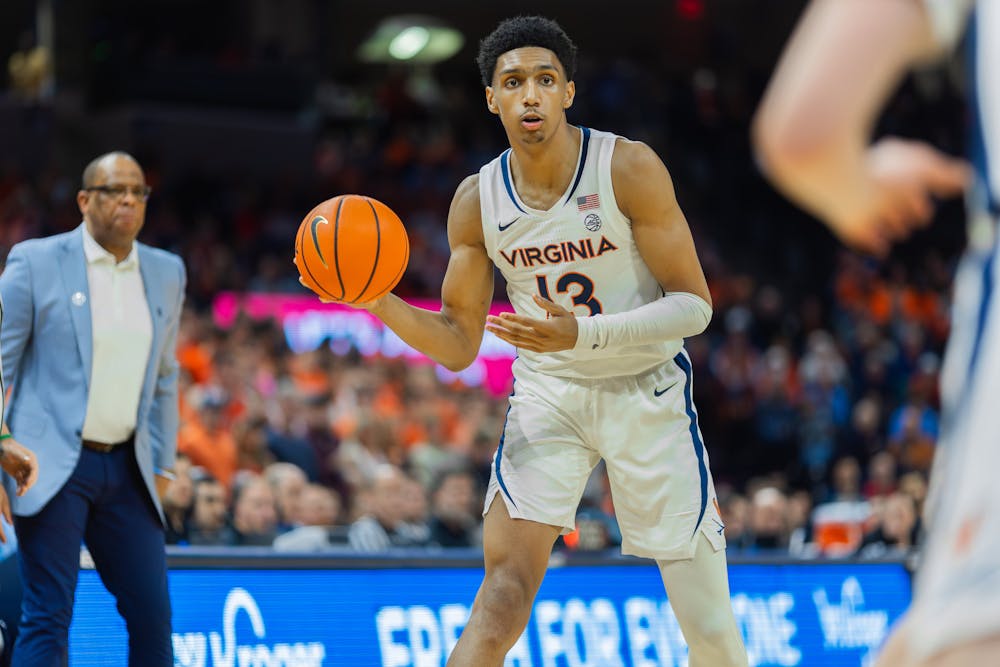Sophomore guard Ryan Dunn announced Tuesday his decision to declare for the 2024 NBA Draft and forgo his two remaining years of eligibility with Virginia. Dunn spent two seasons with the program, asserting himself as one of the nation’s premier defenders with 110 blocks in 65 games and a nod on the ACC All-Defensive Team this past season.
“I had an amazing two years at U.Va.,” Dunn said to ESPN. “I’m focused on the next step in my life now. I got really good feedback from the NBA and am ready for the next level. I am all-in.”
It comes as no surprise that the 6-foot-8 native of Freeport, N.Y. received enough positive assessment from NBA teams to enter his name in this year’s draft — the buzz around his defensive abilities is palpable.
Dunn is coming off a 2023-24 season in which he averaged 2.3 blocks per game, ranking 16th nationally and first in the ACC. The sophomore was the only player 6-foot-8 and under to reach that mark in a high major conference. Dunn’s defensive highlight reel and rebounding ability alone have him slated to be drafted anywhere from the middle of the first round to the early second round, according to numerous draft outlets.
He is propelled by a gaudy 7-foot-2 wingspan that gives offensive players headaches and will be vital for his professional transition. Add in Dunn’s off-the-charts athleticism, and he is set to be an intimidating defender the minute he steps on an NBA court.
While his shot-altering, game-changing dominance in Coach Tony Bennett’s packline defense resembled that of former Cavalier guard De’Andre Hunter — the 4th pick in the 2019 NBA Draft — Dunn does not have the offensive resumé Hunter boasted coming out of college and will be drafted significantly lower as a result. Beyond fastbreak dunks, acrobatic alley-oops and point blank layups, Dunn rarely looked comfortable with the ball in his hands during his time with Virginia. He does not currently possess an off-the-bounce skillset capable of beating an athletic defender one-on-one, which led many of his post opportunities to turn into contested jump shots or inside-out passes.
His jump shot itself is another weakness. Dunn never warranted respect on the perimeter in college, making just 12 three-pointers on 51 attempts in two seasons. Opponents had no problem sending him to the free-throw line either, as the guard finished his career in Charlottesville a touch under 53 percent on free throws.
Paired with a lacking aggressiveness at times, that low level of efficiency led Dunn to post numerous suspect performances last season — he made one or fewer field goals in six different contests despite playing 20 or more minutes in all of them. Perhaps more worrying, his frailties on offense appeared to worsen as the campaign went on — in Virginia’s final 14 games, Dunn averaged just 5.2 points per game on 10 percent shooting from three-point range and 35.3 percent at the line. No matter what he brings as a defender, NBA teams will view that kind of offensive production as a substantial risk in the first round. Dunn noted that he lacked confidence from the perimeter during his college career, emphasizing that it will be a point of emphasis for him as he makes the transition to the NBA.
“Confidence-wise, it wasn’t always there for me just letting it go from beyond the arc,” Dunn said to ESPN. “I’m going to have a whole different mindset with that.”
A changed mindset is necessary, and it will serve Dunn well. NBA teams are shooting more three-point shots and scoring more points than they ever have before, and while there have been places for defensive-minded players lacking an offensive skill set in the past — retired players like Tony Allen and Andre Roberson stand out — they are becoming less and less prevalent in the sport’s modern era. At 6-foot-8, Dunn is going to be a wing player in the NBA and will thus have to develop at least a serviceable jump shot and an average isolation game to stay afloat.
That said, his outrageous athletic attributes and status as the potential best defender in the draft present him with a higher ceiling than most prospects in the 2024 class. NBA teams have taken successful risks on players with similar basketball profiles to Dunn — New Orleans Pelicans small forward Herbert Jones is an easy comparison — and there will likely be a team ready to push their chips in for his one-sided game in hopes he can develop the other side later.
Regardless of where he ends up when the NBA Draft takes place in June, Dunn will make Bennett and Cavalier fans proud. He is set to be Bennett’s first high-school recruit drafted since Hunter in 2019 and the first Virginia player selected since Trey Murphy III in 2021. The Cavaliers have not gone three consecutive drafts without a player being chosen since 2011, and Dunn is going to make sure it stays that way.







